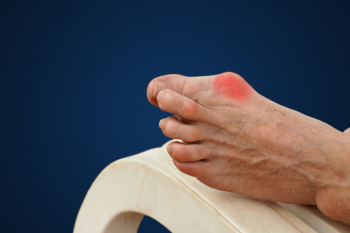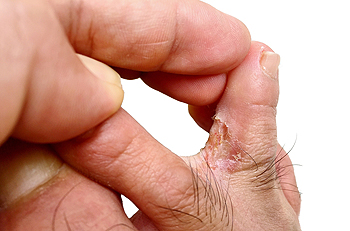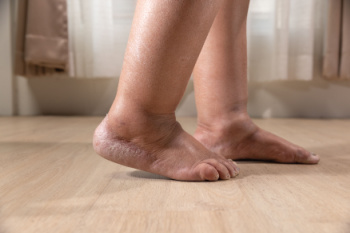

Foot arthritis encompasses several conditions that can cause pain and inflammation in the joints. Rheumatoid arthritis is an autoimmune disorder that leads to chronic inflammation, often affecting multiple joints in the feet. Psoriatic arthritis, associated with psoriasis, can also impact the toes and joints, causing swelling and discomfort. Osteoarthritis, a degenerative joint disease, results from wear and tear over time, leading to stiffness and pain. Gout, characterized by sudden and severe pain, occurs when uric acid crystals accumulate in the joints, frequently affecting the big toe. Finding relief from foot arthritis involves a combination of strategies. Resting and elevating the feet can help reduce swelling. Wearing supportive footwear and engaging in low-impact exercises can improve mobility and enhance overall foot health. If you have arthritic foot symptoms, it is suggested that you consult a podiatrist who can offer you effective relief options.
Arthritis can be a difficult condition to live with. If you are seeking treatment, contact Dr. Harris L. Klear from Burlington County Podiatry Associates. Our doctor can provide the care you need to keep you pain-free and on your feet.
Arthritic Foot Care
Arthritis is a joint disorder that involves the inflammation of different joints in your body, such as those in your feet. Arthritis is often caused by a degenerative joint disease and causes mild to severe pain in all affected areas. In addition to this, swelling and stiffness in the affected joints can also be a common symptom of arthritis.
In many cases, wearing ill-fitting shoes can worsen the effects and pain of arthritis. Wearing shoes that have a lower heel and extra room can help your feet feel more comfortable. In cases of rheumatoid arthritis, the arch in your foot may become problematic. Buying shoes with proper arch support that contour to your feet can help immensely.
Alleviating Arthritic Pain
It is best to see your doctor for the treatment that is right for your needs and symptoms. Conditions vary, and a podiatrist can help you determine the right method of care for your feet.
If you have any questions, please feel free to contact one of our offices located in Marlton and Delran, NJ . We offer the newest diagnostic tools and technology to treat your foot and ankle needs.

The feet are remarkable structures designed for movement and support, playing a critical role in running. Made up of 26 bones, numerous joints, and a complex network of ligaments and tendons, the feet provide both stability and flexibility. When running, the foot strikes the ground absorbing impact through the arches, which act like natural shock absorbers. The big toe plays a vital role in propulsion, helping to push off the ground efficiently. The intricate arrangement of muscles in the foot allows for adaptability on various surfaces, enhancing balance and coordination. Proper biomechanics are essential as any misalignment can lead to injuries. Therefore, understanding the foot's construction and function can help runners make informed choices about footwear and training, ultimately improving performance and reducing the risk of injury. If you have sustained a foot or ankle injury while running, it is suggested that you consult a podiatrist who can offer effective treatment solutions.
If you have any concerns about your feet, contact Dr. Harris L. Klear from Burlington County Podiatry Associates. Our doctor can provide the care you need to keep you pain-free and on your feet.
Biomechanics in Podiatry
Podiatric biomechanics is a particular sector of specialty podiatry with licensed practitioners who are trained to diagnose and treat conditions affecting the foot, ankle and lower leg. Biomechanics deals with the forces that act against the body, causing an interference with the biological structures. It focuses on the movement of the ankle, the foot and the forces that interact with them.
A History of Biomechanics
Modern technological improvements are based on past theories and therapeutic processes that provide a better understanding of podiatric concepts for biomechanics. Computers can provide accurate information about the forces and patterns of the feet and lower legs.
Understanding biomechanics of the feet can help improve and eliminate pain, stopping further stress to the foot.
If you have any questions please feel free to contact one of our offices located in Marlton and Delran, NJ . We offer the newest diagnostic and treatment technologies for all your foot and ankle needs.

A bunion is a bony prominence that forms at the base of the big toe, often resulting from an imbalance in foot mechanics. Common causes include genetics, wearing tight or ill-fitting shoes, and certain foot conditions like arthritis. Symptoms typically include swelling, redness, and pain at the bunion site, along with difficulty in finding comfortable footwear. The big toe may also drift toward the other toes, increasing discomfort. To diagnose a bunion, a podiatrist will conduct a physical examination, assessing the foot's alignment and range of motion. X-rays may be ordered to evaluate the extent of the deformity and rule out other conditions. Early diagnosis is essential, as timely intervention can help manage symptoms and prevent the bunion from worsening, allowing individuals to maintain an active lifestyle without pain. If you have a bunion, it is suggested that you schedule an appointment with a podiatrist who can provide treatment.
If you are suffering from bunion pain, contact Dr. Harris L. Klear of Burlington County Podiatry Associates. Our doctor can provide the care you need to keep you pain-free and on your feet.
What Is a Bunion?
Bunions are painful bony bumps that usually develop on the inside of the foot at the joint of the big toe. As the deformity increases over time, it may become painful to walk and wear shoes. Women are more likely to exacerbate existing bunions since they often wear tight, narrow shoes that shift their toes together. Bunion pain can be relieved by wearing wider shoes with enough room for the toes.
Causes
Symptoms
In order to diagnose your bunion, your podiatrist may ask about your medical history, symptoms, and general health. Your doctor might also order an x-ray to take a closer look at your feet. Nonsurgical treatment options include orthotics, padding, icing, changes in footwear, and medication. If nonsurgical treatments don’t alleviate your bunion pain, surgery may be necessary.
If you have any questions, please feel free to contact one of our offices located in Marlton and Delran, NJ . We offer the newest diagnostic and treatment technologies for all your foot care needs.

Athlete’s foot is a highly contagious fungal infection that thrives in moist environments. This makes places like locker rooms, public showers, and swimming pools common hotspots for spreading the infection. The fungi responsible for athlete’s foot are called dermatophytes. They feed on keratin, which is found in the dead skin cells on your feet. Once the athlete's foot fungus invades the skin, it can cause itchiness, which often leads to scratching. This scratching can push the fungus deeper into the skin, allowing it to spread and persist. Walking barefoot on contaminated surfaces or sharing items like shoes, socks, or towels can also pass the infection to others. Without treatment, athlete’s foot remains contagious, and the infection can linger for weeks or months. A podiatrist can provide a thorough treatment plan, including antifungal medications and advice on preventing reinfection. If you have athlete’s foot, it is suggested that you schedule an appointment with a podiatrist for treatment.
Athlete’s Foot
Athlete’s foot is often an uncomfortable condition to experience. Thankfully, podiatrists specialize in treating athlete’s foot and offer the best treatment options. If you have any questions about athlete’s foot, consult with Dr. Harris L. Klear from Burlington County Podiatry Associates. Our doctor will assess your condition and provide you with quality treatment.
What Is Athlete’s Foot?
Tinea pedis, more commonly known as athlete’s foot, is a non-serious and common fungal infection of the foot. Athlete’s foot is contagious and can be contracted by touching someone who has it or infected surfaces. The most common places contaminated by it are public showers, locker rooms, and swimming pools. Once contracted, it grows on feet that are left inside moist, dark, and warm shoes and socks.
Prevention
The most effective ways to prevent athlete’s foot include:
Symptoms
Athlete’s foot initially occurs as a rash between the toes. However, if left undiagnosed, it can spread to the sides and bottom of the feet, toenails, and if touched by hand, the hands themselves. Symptoms include:
Diagnosis and Treatment
Diagnosis is quick and easy. Skin samples will be taken and either viewed under a microscope or sent to a lab for testing. Sometimes, a podiatrist can diagnose it based on simply looking at it. Once confirmed, treatment options include oral and topical antifungal medications.
If you have any questions, please feel free to contact one of our offices located in Marlton and Delran, NJ . We offer the newest diagnostic and treatment technologies for all your foot care needs.

Foot swelling, medically known as edema, occurs when excess fluid accumulates in the tissues of the feet. This condition can arise from various medical reasons, including heart failure, kidney disease, and venous insufficiency, where blood flow is impaired. It can also result from injuries, infections, or certain medications. Symptoms of foot swelling include noticeable puffiness, increased circumference of the foot, and discomfort or tightness in the affected area. In some cases, the swelling may be accompanied by pain or difficulty in movement. Identifying the underlying cause is vital for effective treatment and management. If your feet have become swollen, it is suggested that you confer with a podiatrist who can determine the cause and offer relief and treatment options.
Swollen feet can be a sign of an underlying condition. If you have any concerns, contact Dr. Harris L. Klear of Burlington County Podiatry Associates. Our doctor can provide the care you need to keep you pain-free and on your feet.
Swollen feet are a common ailment among pregnant women and people who stand or sit for extended periods. Aging may increase the possibility of swollen feet and patients who are obese often notice when their feet are swelling too. There may be medical reasons why swollen feet occur:
Swollen feet can also be caused by bone and tendon conditions, including fractures, arthritis, and tendinitis. Additionally, there may be skin and toenail conditions and an infection may cause the feet to swell. Patients who take medicine to treat high blood pressure may be prone to getting swollen feet.
Many patients elevate their feet to help relieve the swelling and this is generally a temporary remedy. When a podiatrist is consulted the reason behind the swelling can be uncovered and subsequently treated.
If you have any questions please feel free to contact one of our offices located in Marlton and Delran, NJ . We offer the newest diagnostic tools and technology to treat your foot and ankle needs.